
A plan that will serve as a roadmap for California to reach its 2045 decarbonization goal may be delayed by six months after a state environmental justice committee asked for more time to finish its work.
Members of the Environmental Justice Advisory Committee (EJAC) last week agreed to send a letter to Gov. Gavin Newsom requesting a six-month extension for adopting the plan, moving the deadline to mid-2023 rather than the end of 2022.
The California Air Resources Board (CARB) convened the committee in May to make recommendations on the agency’s 2022 scoping plan, which will serve as a blueprint for the state to reach carbon neutrality by 2045.
Under AB 32, the Global Warming Solutions Act of 2006, CARB must update the scoping plan every five years. The most recent update was in 2017.
But the committee’s letter to Newsom notes that AB 32 allows the governor to adjust scoping plan deadlines “in the event of extraordinary circumstances.”
The extraordinary circumstances in this case include the COVID-19 pandemic as well as extreme weather events such as large wildfires across the state, committee members wrote. These events have made it difficult for EJAC members to conduct outreach on the scoping plan with the communities they represent.
Another extraordinary circumstance, according to the committee, is “the need to allow time for sufficient and meaningful community engagement that was absent from prior scoping plan processes.”
EJAC consists of representatives of communities most heavily impacted by air pollution, including low-income or minority populations. The committee is a requirement of AB 32. CARB appointed some committee members in May and added others in August.
The timeline for EJAC’s work on the 2022 scoping plan was the focus of discussion during the committee’s Oct. 12 meeting.
CARB is asking EJAC to weigh in on scenarios being considered in the scoping plan. In general, the four scenarios being discussed include decarbonization by 2035 or 2045, either with or without a “full suite of technology options,” such as engineered carbon removal.
CARB staff agreed to shift the deadline for the committee to provide input on the scenarios by a month, from the original Oct. 22 deadline to Nov. 24. After that, a consultant will perform modeling on the scenarios in a step that will lead to a final draft scenario.
EJAC member Catherine Garoupa White, executive director of the Central Valley Air Quality Coalition, said during last week’s meeting that she opposed moving ahead with scenario modeling until the community has a chance to weigh in.
She said she was troubled that the strategies presented included continuing cap and trade and carbon capture and sequestration.
“I want to be very clear and on record that I cannot support moving forward with modeling scenarios before we have a public process, because that does not do justice to hearing from the most impacted community members,” Garoupa White said. “What issues they’re experiencing, and how to make sure we’re matching the solutions to that.”
EJAC member Connie Cho, a justice catalyst legal fellow with Communities for a Better Environment, asked whether CARB would support the committee’s request to the governor for a deadline extension.
CARB Executive Officer Richard Corey said that wasn’t possible.
“When it comes to statutory changes, changes to law, it’s the administration that takes positions, agencies don’t take positions,” Corey said. “I can’t weigh in on a proposed change to the law.”
Similarly, CARB Chairwoman Liane Randolph would defer to the administration, he said.
Corey noted that while the scoping plan is important, it’s just one step toward achieving climate goals.
“It is a precursor to rule development, regulation development … all of which take time,” Corey said, adding that later steps would also include opportunities for public involvement.
EJAC members submitted a proposed timeline for the scoping plan that includes extending the period for scenario workshops to the end of November. That would help ensure that committee members understand the material well enough to share it with communities they represent.
Community outreach meetings would be held in December and January. Committee members would then report back on feedback received, which would be used to shape scenarios.
The EJAC would conduct another round of public outreach when CARB releases a draft scoping plan, a step expected in December 2022 or January 2023 under the committee’s timeline.
The CARB board would then meet to approve the scoping plan in June 2023.



